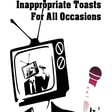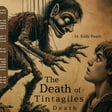
Guest: Author and Publisher Alex S Johnson
Alex S. Johnson is the author of numerous books of science fiction, fantasy, Bizarro and horror, among which are The Doom Hippies, Doctor Flesh, The Death Jazz and Bad Sunset: A Splatter Western. His work has been praised by the likes of John Shirley, Bram Stoker Award winning author, screenwriter (The Crow with Brandon Lee), and lyricist for bands like Blue Oyster Cult; the late horror grandmaster Ray Garton, and esteemed poet Ellyn Maybe. He is the creator of the anthologies Floppy Shoes Apocalypse (clown horror) and Dreams of Fire and Steel (sword and sorcery) among many others. He was a music journalist for 25 years with publications in Metal Hammer and Experience Hendrix. He has taught college composition. Johnson currently is semi retired and lives in Sacramento, California where he runs Nocturnicorn Press. He’s also doing a poets interview archive project called Songs of Myself. Yet...he'd never done a MadLib before this interview.
We talk clown horror, hysteria, brain diseases and cognitive tests, circuses, Gregor Samsa, Kaiser Permanente, and a whole bunch of horror movies.
This ep is the last one recorded before we got a new host and a better mic. Pardon my sniffles, but there was nothing to be done. A transcript of this episode can be found here.















